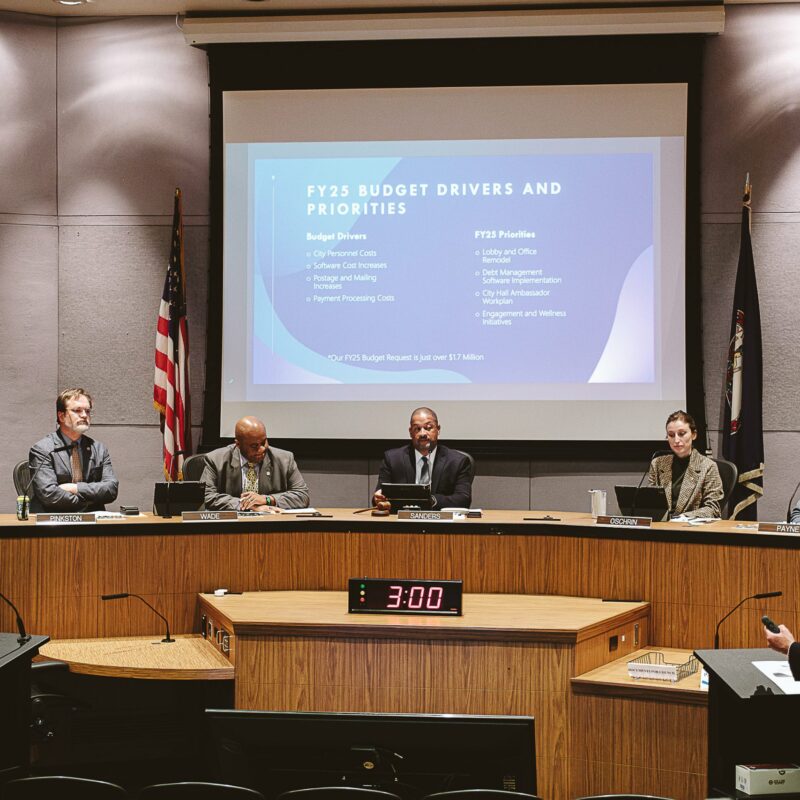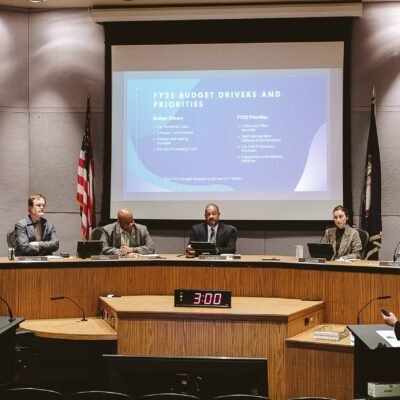At 9:30am on a Wednesday after heavy rains, 13-year-old Spencer Wood sits atop a hill in Afton, inspecting his surroundings. While most 13-year-olds in Albemarle County are in a classroom at this very moment, Spencer is surveying what has changed here at his “sit spot”—looking for changing leaf colors, new plant shoots, evidence of animal life. His spot has great views of several pristine acres and a small creek. With his back pushed up against a tree and his legs dangling in front of him, he is pensive, calm and collected.
|
The most productive hours in Spencer Wood’s day are late at night, passed his 11pm bed time. As an unschoolers, he studies on his own terms, what he wants, when he wants to. In the wee hours of the night, he writes sci-fi and fantasy stories. The problem, he says, is sticking to a single project. “Maybe someday I’ll be looking through all my stuff and I’ll have a gazillion ingenious beginnings and nothing that comes after page 20.” |
Soon, the blissful silence is broken by fellow explorers’ giggling. Though Spencer is one of almost 500 children who are homeschooled from Charlottesville and Albemarle, he doesn’t go completely without instruction from a teacher or lack interaction with other students. In fact, he is enrolled in a course through The Living Earth School, one of several local organizations that support homeschoolers. At the Afton school, where Spencer is easily one of the older kids in the group, students learn a gamut of nature-based skills worthy of Bear Grylls’ “Man vs. Wild”: survival tactics, bird language, wild food sources, primitive cooking, and animal tracking, among others.
Fellow students discuss the impact the recent rains had on their surroundings. Spencer looks back in the direction of base camp. A dozen backpacks and lunch bags are placed in a circle down below where two instructors are going over the day’s activities. The call to go back to camp comes crystal clear. Spencer leaves his spot and joins the others.
What really separates Spencer from a typical middleschooler is that as a homeschooler, he has the freedom to study what he wants, when he wants. For this nature immersion course, every Wednesday from 9am to 3pm for eight weeks, Spencer leaves the comfort of his warm bed—he likes to get up “as late as physically possible”—and joins a couple dozen homeschoolers, some of whom drive from Richmond.
The only other structured parts of his week are classes in Games and Strategy and drama, among others, that he takes through the Community Homeschool Enrichment Center that meets at a church in the outskirts of Belmont.
Otherwise? “I might slack off for a couple of hours or I might be doing something productive,” he says. Normally, the early hours are the hardest, probably the reason why he would not do well in school, he says with a smile.
His sentiments about what either private or public schools offer are clear. “I suppose that at some point I probably am going to have to try school for at least a semester and see how it works out, but I admit, I am kind of cynical about how it would go,” he says. “The whole idea sounds like it’s completely horrible, but I guess I can’t make my ultimate lifelong this-is-right, this-is-wrong decision about it until I’ve actually tried it.”
•
Though there is no such thing as a typical homeschool student, Spencer’s education reflects a growing trend in the homeschooling world. His learning follows the idea of “unschooling,” an educational philosophy that involves letting a child make his own choices about what he wants to know.
These days, Spencer’s main interests are literature and philosophy. He is into Kierkegaard, “who was huge on faith” but “a complete madman;” Nietzsche, “also a complete madman, but a really interesting person;” and Socrates: “You can’t really study philosophy without [reading] Socrates.”
Know these organizationsThe Living Earth School Community Homeschool Enrichment Center (CHEC) Albemarle County Homeschoolers Network Albemarle Christian Teaching Home Educators Association of Virginia |
Whip smart, with dark hair purposefully covering his eyes, Spencer is sarcastic and freely calls himself “weird.” What he enjoys most about homeschooling is the freedom to choose “what I am learning about instead of having to take this class and this class and being able to actually study things that I am interested in, so I am not just sitting there wondering why exactly I am supposed to learn something,” he says.
His most prolific hours are at night. He says he has had some interesting discussions with his mom about “becoming nocturnal,” a product of the sci-fi and fantasy stories he writes way past his bedtime, which his mom sets at 11pm. He and his friend Finn have a theory: “If you eat waffles at 4am you can get some really creative ideas.”
He studies on his own terms, and what he decides to take on, he does with vehement passion. The problem, he says, is sticking to one project. “Maybe someday I’ll be looking through all my stuff and I’ll have a gazillion ingenious beginnings and nothing that comes after page 20.”
Deciding to homeschool
For Elisa Wood, Spencer’s mom, homeschooling almost fell into her lap. In the 1980s, she was working for a Cape Cod newspaper when she got a call from the local school district about a family homeschooling their children. She was encouraged to interview them. She did, and was impressed with their then avant-garde outlook. “I was intrigued.”
For the Wood family, home education began with oldest daughter Lyndie, who is now in college in Massachusetts, and continued with Spencer.
Elisa’s decision wasn’t dictated by not liking what the schools had to offer, but rather, “the fact that you can individualize and customize the education to the child’s skills and talents and needs appealed to me tremendously, because I remember in school feeling so homogenized,” she says. When she was in school, she was bored and often skipped class to go read in the library. Homeschoolers, she says, are free to read when they want.
During the every day hustle and bustle of raising a teenager, Elisa is as strict and careful as you’d expect from a mom. When it comes to Spencer’s education, however, she says she tries to be a facilitator rather than an instructor. In the end, it’s her son’s responsibility to keep up with reading, writing and any other subject he is interested in.
“That’s one of the big differences I have seen in homeschoolers versus the school kids, in that they are not sitting back waiting to be fed information, they do not come at their lives as though somebody else is going to put them on a track towards a profession,” she says.
Not that Spencer needs any help deciding what to be when he grows up.
“I would like to do some kind of writing-focus thing,” he says. “I could potentially be a professor of philosophy or something like that. That’s a secondary goal. I definitely want to go to college unless I end up being one of those people who hits it big at 15 and everybody hates them.” He laughs.
Spencer’s education does have some outside oversight from the Commonwealth. At the beginning of each year, Elisa Wood must file a “notice of intent” with the local school superintendent. In order to homeschool, a parent needs to satisfy one of four options. She must document that she’s qualified, which in Virginia means that she has a high school diploma, or is a certified teacher, or can otherwise show adequate qualification. Another option is to submit a broad description of the curriculum of study through a distance learning program or correspondence course. At the end of the school year, Spencer must demonstrate “evidence of achievement,” which could mean anything from taking SOL exams to submitting an evaluation from a licensed person with a master’s degree.
Matt Haas, director of secondary education for Albemarle County Schools, is the link between homeschooling parents and the school system.
“I am not looking to see ‘are they making specific progress,’” says Haas. “I am here to just ensure that the families do the assessing and see how the students are doing each year.”
Though homeschooling predates even the concept of public education, its modern American incarnation didn’t begin to emerge until the early 1980s, as states were pushed, generally by religious-minded parents, to become more open to the practice. Virginia’s homeschooling standards today are relatively lenient compared to other states.
“We are pretty hands off in terms of regulating individual families’ homeschooling,” says Haas. “Some of the families that I talk to when they first come to Virginia, if they come from another state [that’s] more hands-on, we have some interesting discussions.”
Locally, homeschooled children comprise about 2.8 percent of the student body, compared to about 3 percent nationally—there were an estimated 1.5 million students being homeschooled in the United States in 2007 and some experts say the number has increased in the last few years. While it’s estimated that a majority of parents nationally choose homeschooling for religious reasons, the numbers locally appear lower—only 16 percent of the 475 homeschooled students in Charlottesville and Albemarle specifically filed a religious exemption for this academic year.
Most area parents seemed to have chosen homeschooling in order to customize their children’s education. Several opted for “unschooling,” with its self-guided method.
However, unschooling doesn’t work for everyone. Chris Anderson, a homeschooling parent who recently moved to Charlottesville from Massachusetts, says unschooling worked well for her oldest son, now at the University of Chicago, but she had to pull back with her 14-year-old son, Chiron.
“Homeschooling is very flexible and that’s the beauty of it,” she says. “For many years we went through [unschooling] and he did what he wanted, and when that wasn’t working anymore, we tried a new thing. That’s truly an advantage.” Chiron now has a loose curriculum that still allows him to study what he likes, but with a few more set and achievable goals.
Anderson chose homeschooling because, like Wood, she did not have fond memories of her own time in school. “Both my husband and I were really bored in school and I just thought, ‘There has to be a better way,’ and it was always on the back on my mind.”
A wide array of resources
Both Elisa Wood and Chris Anderson are energetic moms in their early 50s who have taken on a seemingly enormous responsibility. Yet they are not stressed by their sons’ independent thinking. Elisa says that when people ask her how she handles homeschooling a teenage son, her answer always surprises them.
“It’s really easy,” she says. She feels for other moms who are constantly stressed about parenting groups, fundraising for their children’s private schools and endless extracurricular activities.
“The resources are so enormous now, more than when I started with [my daughter] Lyndie 18 years ago,” says Elisa. “Whatever you really need is out there—there are tutors, there are classes, there is somebody else who knows it. It’s not hard.”
Anderson agrees. “You can swap with another parent, we take turns teaching subjects,” she says. “It’s not like the one parent has to know everything there is to know.”
To ease the burden on parents, a vast gamut of resources to supplement students’ self-chosen curricula has sprung up in Charlottesville and Albemarle [see sidebar on this page].
The Community Homeschool Enrichment Center (CHEC) was created five years ago for homeschoolers “to come together and get classes that they might not get within the homes,” says Jennifer Borishansky, CHEC’s director. It was also created to give parents a break from the educating and parenting that goes on every day, all day.
|
As a nature-based educational organization, The Living Earth School teaches homeschool kids how to live in unison with their surroundings and to know how much impact they have on the ecosystem. “It’s just a way to get homeschoolers together in a nature focused way,” says Kate Knott, the school’s co-director. “It’s really about making deep connections with nature and letting them find their own natural leadership.” |
Borishansky began homeschooling when her first son was born with special needs and continued it with her youngest son. “As a parent of a child with autism, this was really appealing to me and I learned to follow his cues,” she says.
CHEC’s classes cost between about $100 and $150 for 12 weeks and range from biology to comic book creation to Quidditch—a game based on the world of Harry Potter. Local activist Stratton Salidis teaches the most popular class, Games and Strategy.
“Kids are naturally curious,” says Salidis. “However, our [traditional] schooling system tends to make the opposite assumptions, that we have to force kids to learn and adapt well to society. But, I think, in general, we just need to provide opportunities and resources and let them lead the way.”
With more and more homeschoolers taking classes as a supplement to their daily learning, at what point does it stop being homeschooling and start being school?
“The big difference with homeschooling is that the kids are free to chose what they want to study and when they want to study versus the every day, five days a week curriculum that is set for them,” says Elisa.
Silvia Barrett founded the Albemarle County Homeschoolers Network in 2003 to connect homeschooling families with each other and with the resources available to them. Its member list grew from 100 families to 600 over eight years, most of the growth through word of mouth.
Organizations have also sprung up specifically to help Christian homeschoolers. Rob Schilling—former Charlottesville city councilor and host of the conservative “Schilling Show” on WINA Newsradio—and his wife Joan homeschool their son, who also attends classes at Albemarle Christian Teaching Support, Inc., a Christian educational organization that hosts its classes at The Covenant Church of God. To be a member, teachers have to sign a statement of faith.*
“This ensures that those who believe in the Bible and who follow Christ lead our organization and teach our children,” the organization explains on its website. “Our leaders and teachers will make decisions and plan activities that are pleasing to God and are in accordance with his Word.” Among ACTS’s class offering are creation-based science courses and all levels of English, history and writing classes.
There’s also support at the state level. Yvonne Bunn, director of homeschool support and government affairs with the Home Educators Association of Virginia in Richmond, says that every year, homeschoolers in Virginia increase by 12 percent. Currently, the Commonwealth is home to about 32,000 homeschoolers.
“We are getting more and more phone calls every year,” she says. Bunn, herself a home education veteran, teaches seminars throughout Virginia on how to begin homeschooling, how to choose a curriculum, and what Virginia law requires.
She has homeschooled three of her five children from kindergarten to 12th grade, and she may have homeschooled all her children if she had been allowed to. Not until 1984 did the General Assembly allow parents to teach their children at home legally.
“We began homeschooling in 1985 and we homeschooled our last three children all the way through and they didn’t have any difficulty getting into college at all,” she says.
The case against homeschooling
Not everyone thinks the rising trend of homeschooling is a good thing. Robin West, a law and philosophy professor at Georgetown University, penned a firm criticism of lax homeschooling regulation that was published in a 2009 public policy journal. The low level regulation, she argues, can lead to unreported physical abuse and a public health risk since homeschoolers are not required to submit immunization requirements.
“In unregulated states, parents need not teach their children a thing, if they so desire. Religious parents can teach nothing but the Bible, and nothing but a literal interpretation of that, and secular anti-schooling parents can allow their children to skateboard, dance, or play video games to their hearts’ content, free from any dull training in reading and arithmetic,” she writes.
West’s criticism assumes that the government can do a better job with instruction, which naturally many homeschooling parents dispute.
Schilling chose homeschooling because he has “no faith in government schools in America today.” A former middle school English teacher, Schilling says he has a problem with public schools “having taken out any reference to God.”
|
Jennifer Borishansky, director of the Community Homeschooling Enrichment Center, says homeschooling worked for her family and her first son. “As a parent of a child with autism, this was really appealing to me and I learned to follow his cues,” she says. “It inspired me to think beyond what I had experienced in the public school system.” |
“The Bible was considered a primary textbook and you’ve gotten so far away from that that I don’t think it’s a coincidence the lack of achievement in American schools and the problems that we have.” Though he and his wife did not file for religious exemption, he says that exposing children to an environment where God is absent is dangerous for imparting his values to his own children. He adds that in today’s public schools, the level of indoctrination and lax discipline is alarming.
“I don’t think that [school] teaches students to think for themselves, I don’t think it values individualism,” says Schilling. “I think it values corporatism and I think it values collectivism.”
To such claims, Matt Haas of Albemarle County School says that “we are fortunate to live in a nation, a state and a community that supports choice.” Although he doesn’t have many in-depth discussions with homeschooling families about their choice, he says he respects it.
“I know that there are a variety of reasons for why a family makes that choice, and I am very supportive of it,” he says.
The most common criticism of homeschooling is its lack of socialization. Robert Pianta, dean and professor at the UVA Curry School of Education, says that homeschooling is a valid way of learning and that the evidence doesn’t tilt strongly for it or against it. But he does acknowledge the concern regarding exposure to peers.
“I think one of the things that happens in schools is you have to learn how to get along with other people who are not like you,” says Pianta, “and I think that a lot of homeschool groups, and I know parents pay a lot of attention to that, work very hard to create peer opportunities for their kids.”
In his experience, Haas says those homeschoolers who decide to go back to school only suffer minor adjustments.
“What I found is that they generally are not academic challenges,” he says. “The kids that we have coming in from homeschooling are pretty well prepared academically, which speaks to why we support it. Usually it’s just fitting in with the size of the environment. The kids that are homeschooled are not as isolated as we think.”
•
Parents who homeschool have gotten used to the socialization question—it’s usually one of the first things people ask.
“When you homeschool, most of the time, especially when your kids are younger, you spend time socializing, going to parks, playing sports and being involved in activities and clubs and reading groups,” says Silvia Barrett. “Is it the ability to sit in a classroom with 20 or more kids all the same age and listen to the teacher and answer the way the teacher wants you to answer? Or is it part of being a member of the society that you live in and being able to deal with a wide variety of people?”
Even ardent supporters, however, recognize some inherent disadvantages to homeschooling.
“For us, both here and back [in Massachusetts], we found that just trying to get the kids together, it’s not like you go outside and there are homeschoolers who live next to you,” says Anderson. “There is a lot of driving involved,” whether for play dates or classes at co-ops or support groups.
For Schilling, the challenge with homeschooling is “the sacrifice for the family.” His wife Joan, who has a Ph.D. in education, has chosen to stay home instead of using her degree in the professional world.
“This is a sacrifice that we made knowingly and this is a sacrifice that we do joyfully,” he says. Although it can be difficult at times, he says the benefits are happy and informed children.
For most families, the sacrifice is also financial. Barrett stopped working when her first child was born. Yet, the last couple of years have been difficult. The struggling economy forced her husband to go back to school—he was a real estate appraiser—and she had to go back to work part-time.
“It’s been very difficult from that perspective, but it’s totally worth it,” she says. “It’s not something we would reconsider.”
“Nothing is perfect”
So far, homeschooling has worked for the Wood family. Spencer’s older sister, Lyndie, attends Hampshire College in Amherst, Massachusetts, and is enrolled in a molecular neuroscience program.
Athough Lyndie took a few art classes through enrichment centers and homeschool organizations, when she was ready for college, she began taking some classes at Piedmont Virginia Community College. Elisa tells me that she remembers her daughter being nervous and insecure about how she would stack up against other students.
“I remember she went to take the entrance exam and she got a perfect score. It was a validation for her,” she says with a proud smile.
Lyndie thinks homeschooling worked well for her. “I loved it. I am eternally grateful to my parents for choosing to homeschool me,” she writes by e-mail. “Learning never became a chore. I never really learned the false dichotomy of classroom vs. ‘extracurricular’ learning. I became very self-directed, very self-motivated, from an early age. I learned to judge my own progress rather than always looking to someone else for evaluation.”
The hardest part, she says, was making friends when her family moved from Massachusetts to Virginia when she was 14. “But all in all, I really don’t look back on it as a negative experience, because I learned how to be proactive about making friends. Instead of wallowing in teenage angst (which was tempting, being 14 and all), I sat down and thought ‘I have a problem. How do I fix it?’ And I figured out solutions. By the time I was 16 I could hardly go anywhere in Charlottesville without running into people I knew.”
Even at only 13, Spencer seems to have perspective on his education.
“I just think it’s overzealous for a lot of people to say that homeschooling is the perfect system, since nothing in our society is the perfect system. It’s kind of unlikely that we have that,” he says. “Do I think it’s a better system than most of the others? I think it’s not quite as black and white as people like to make it out to be.”
*This sentence was altered May 18 to clarify that parents need not sign a statement of faith.
/spencerportraits0032.jpg)
/RI_-IMG_5449.jpg)
/RI_-IMG_6636.jpg)





